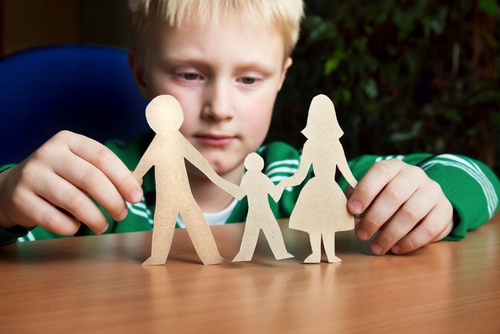
I get asked all the time, "What is joint custody in NJ? What does it really mean in practical terms to me?"
The bottom line is that in New Jersey, there are two broad types of custody.
Physical custody deals with where the child lives, and legal custody deals with who makes major decisions for the child.
Regarding legal custody, since 1981, we've had a concept in New Jersey called joint legal custody.Early on, joint legal custody was limited to those cases where parties could really be counted upon to agree with each other, and to work things out in the best interest of the children. That's really what the Supreme Court had in mind when it decided the case of Beck v. Beck back in 1981. Basically, a situation in which the Supreme Court said at that time was not the most common, but one in which the parties, despite getting divorced, could still work together, could still count on each other, and could be counted upon to be joint legal custodians.
So, for the first time in 1981, in the case of Beck v. Beck, the New Jersey Supreme Court authorized divorce court judges to order joint legal custody -- but only in these circumstances where the Judge believed that the parties were a position where they can work together, as determined by the judge at a trial.
Now fast forward some 42 years later to 2023. Today most divorce court judges in the State of New Jersey have embraced the concept of joint legal custody as the standard, and no longer the exception.
So they've done a complete 180 from what the Supreme Court initially ordered back in 1981, in Beck v. Beck. Now, most judges take the view that the default position should be joint legal custody, unless there is some compelling reason against it.
And it's been that way for many years in this state.
So, most people can count on having joint legal custody, which again maintains both parents with an equal voice in all major decisions affecting the children, including their general well-being, their health, what doctors they go to, what medical procedures they may have done, their education, their college, etc.
The point is that when joint legal custody exists then all of the decisions that are major factors in the life of the children must have the equal input of both parents.
That's essentially the concept of joint legal custody in New Jersey as it presently operates.
Now, that's a whole separate concept from the concept of physical custody.
Physical custody essentially deals with where the children will live.
When I started practicing divorce law back in the 1980's, the general rule was the children lived with Mom, and Dad visited. That's what judges ordered most of the time.
Basically, the kids were with Mom. Dad had visitation every other weekend, from either Friday night through Sunday night, or Saturday morning through Sunday night, plus Wednesdays for dinner.
Well, that's changed completely in the 33 years that I've been a NJ divorce lawyer, so much so that a lot of fathers now fight for (and often receive) joint physical custody as well as joint legal custody.
In many of the cases that I have, fathers have essentially said, "Every other weekend? No way, that's not the way I parent. I want my kids every second that I can get them. I'm not trying to take them away from their mother, but she should not try to take them away from me either."
The father will often say, "I want true 50/50, which means maybe the kids will have 1 week with me, 1 week with their mother, or maybe I get certain days and she gets certain days. Maybe she gets more days during the school year and then I get most of the summer to make up for it, but I want 50 percent of the time."
There is a whole time-sharing spectrum that a family can fall between, and the good news is that through mediation, we have the ability to customize something that works best for you, your spouse and your kids.
If you go to trial before a NJ Superior Court judge, then the Court is going to listen to the testimony and then decide what it thinks is in your family's best interest (and then essentially shove it down everybody's throat).
The beauty of the mediation process is that we have that ability to tailor make something that works for your family, within the parameters of joint legal custody and physical custody.
Now, in my personal opinion, sometimes joint custody is a "cop-out." If you want to know why I feel that way, CLICK HERE.
THERE'S A LOT MORE FREE HELP WHERE THIS ARTICLE CAME FROM
If you are considering separating or filing for divorce, the most important thing for you to do before doing anything else is to learn how to protect yourself, your children, and your assets.
undefinedI'll show you how you can do it.
I've specialized in divorce and child custody for 37 years, and I've successfully represented many people against spouses who have engaged in child alienation practices.
I "get it" and I'm here to help.
Steve Kaplan's Divorce Course will teach you how to turn your situation around to your advantage.
Getting a divorce from a spouse who is manipulating your child against you will require you to make many tough decisions.
Making the wrong decision can be the difference between getting a good result (or at least a result that you can live with) and getting a bad result.
Getting "the edge" in your divorce case from your child-alienating spouse will come down to developing the ability to consistently make the right decisions in your case.
And that's where I come in.steven
My emails will teach you, in an easy to understand way, everything that you need to know to help you make the right decisions for you, based upon the specific facts of your case and the specific behavior of your alienating spouse.
You will get my best articles.
I get emails from strangers all the time thanking me for making this information available to them online at no cost.
I'm pretty certain that you, too, will get a lot of value from my emails.
And if you want to stop the emails, I made it really easy for you to do that...
One click on any email stops the course.
But few people do that...
Because the material is really helpful to anyone who is thinking about getting a divorce in New Jersey.
Are you ready to start turning things around?
The next move is up to you...!
Click the link above and begin learning how to get the "edge" in YOUR New Jersey divorce case.
Until next time,
Steve
Steven J. Kaplan, Esq.
Specializing In Divorce
In Monmouth County
5 Professional Circle
Colts Neck, NJ. 07722
www.KaplanDivorce.com
(732) 845-9010





